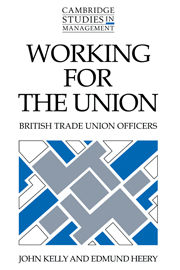Book contents
- Frontmatter
- Contents
- List of figures and tables
- Preface
- List of abbreviations
- Part 1 Introduction
- Part 2 The parameters of union work
- Part 3 The full-time officer at work
- 6 Organizing
- 7 Bargaining objectives
- 8 The bargaining process
- 9 Dealing with managers
- Part 4 Conclusions
- Appendix: Research methods
- Notes
- Bibliography
- Index of names
- Index of subjects
- Cambridge Studies in Management
8 - The bargaining process
Published online by Cambridge University Press: 22 October 2009
- Frontmatter
- Contents
- List of figures and tables
- Preface
- List of abbreviations
- Part 1 Introduction
- Part 2 The parameters of union work
- Part 3 The full-time officer at work
- 6 Organizing
- 7 Bargaining objectives
- 8 The bargaining process
- 9 Dealing with managers
- Part 4 Conclusions
- Appendix: Research methods
- Notes
- Bibliography
- Index of names
- Index of subjects
- Cambridge Studies in Management
Summary
Introduction
In this chapter we look more closely at the process and outcomes of collective bargaining. We start by examining the general approach to bargaining adopted by officers and, as in chapter 7, proceed to examine the determinants of these approaches, looking in turn at inter-union differences, the nature of the issues involved, the values of officers and the structural properties of unions and companies. We then look more closely at the systems of argument used by officers; at the conditions under which industrial action is threatened; at moves toward final settlement; at the outcomes of bargaining; and finally we consider the power base of the officer in dealing with shop stewards and union members.
The bargaining process
Approaches to bargaining
Officers approached collective bargaining in many different ways: some were very friendly and discussed personal matters with their management counterparts both before and after bargaining sessions (see Table 8.1). One managerialist officer even invited two of his management counterparts back to the union office and proceeded to gossip about a number of their shop stewards. Others (particularly regulationists) adopted a neutral and formal approach, eschewing the ‘cosy chats’ of their often older and more conservative fellow-officers, and disparaging what they frequently referred to as ‘knife and fork’ bargaining, conducted over the dinner table. Officers in Watson's (1988) study also criticized those who become over-friendly with the employer, and in very similar terms: ‘We all know of officers who go about with a knife and fork in their top pocket’ (Watson, 1988: 141).
- Type
- Chapter
- Information
- Working for the UnionBritish Trade Union Officers, pp. 144 - 172Publisher: Cambridge University PressPrint publication year: 1994



